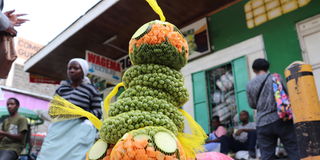The down side of selling ready to cook vegetables in Nakuru city

Fresh vegetables are displayed outside Wakulima market in Nakuru city.
Although the wholesale vegetable market offers a variety of fresh produce and goods, shopping here proves strenuous and always calls for swiftness and alertness.
This is where vegetable vendors, who have decided to sell their produce as ready-to-cook, come to the rescue of bachelors and spinsters alike, who express the desire for a soft life.
Initially, the traders sold the goods as a whole but have since decided to help consumers with ease of preparation.
Over a year ago, Mercy Wanjiru, a vendor of vegetables at Wakulima Market, tells Mtaa Wangu that she decided to package ready-to-eat vegetables to supplement her income.
She operates her stall within the market during the day and extends her sales efforts into the afternoon, targeting the influx of customers passing by the market vicinity.
"I decided to prepare peas, French beans, courgette, and carrots as ready-to-go vegetables to earn additional income, but as time went by customers became receptive to the product and have continued since then."
Although profitable, Wanjiru mentions a few challenges she faces in the business.
"Selling outside the market means I am constantly in a rat race with the kanjos, which is exhausting. At the same, the vegetables are highly perishable, and if by the end of the day I have not sold my stock, I end up giving them away to friends, resulting in financial losses," she says.
Cassavas too, has joined the league of being prepared beforehand.
The tuber that has long been known to make flour until recently is undergoing a lot of value addition.
Rael Nyongesa, a cassava trader, tells us that the preparation beforehand has not only made work easier for her clients but for her as well.

Rael Nyongesa displays peeled cassavas outside Wakulima market in Nakuru city.
“When I started selling cassavas a year and a half ago, I was met with the challenge of explaining to every customer that the species I had was not poisonous,” she says.
Nyongesa continues to say, “Additionally, many of my clients have white-collar jobs and barely get the time to peel the cassavas when they get home, thus, peeling it for them has not only eased its preparation but has also seen my business attract a lot of customers from the same calibre.”
During our interview, a customer, after buying the cassavas, pauses and enquires about the preparation method. She guides him.
Nyogesa confirms that it is quite common since many of her young customers buy the tuber out of curiosity and peer influence. This is so owing to their upbringing in town and having not experienced its preparation.
Mtaa Wangu found that the price point of the packed peeled cassavas is a bit fairer, starting at Sh. 50, compared to the unpeeled ones, which begin at Sh. 100 going upwards.
Like her counterpart, Nyongesa highlights her fair share of challenges with the tuber.
“Cassavas are highly perishable once peeled, and if the planned stock doesn't sell, I can easily suffer losses. This has compelled me to always bring just enough quantity to meet the market demand daily and ensure they are sold. I also ensure to preserve them in water rather than exposing them to direct sunlight to maintain their white colour, as customers are put off by discoloration.”
“The tuber is extremely delicate, especially during handling. They become very bitter if mishandled which can drive customers away. As a trader, I must handle my goods with care to meet the demands of my market,” she closes.
